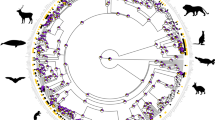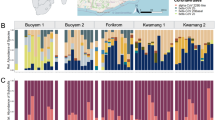Abstract
PHORESY among arthropods has been widely noted and its importance in population dispersal and survival appreciated. Hypopi, the phoretic stage of mites, have been studied for the most part isolated from their hosts, and little is therefore known of their interaction. We have recently described some behavioural adaptations of the hypopus of Myianoetus muscarum (Anoetidae) to fly factors which favour the mite's dispersal1. Hypopi are attracted to a volatile substance produced by the pupæ of several fly species, including Musca domestica, Muscina stabulans and Stomoxys calcitrans, and cluster on the anterior end of the pupal case from which the fly is due to emerge. This communication describes the behaviour of the same mite on adult M. stabulans.
This is a preview of subscription content, access via your institution
Access options
Subscribe to this journal
Receive 51 print issues and online access
$199.00 per year
only $3.90 per issue
Buy this article
- Purchase on Springer Link
- Instant access to full article PDF
Prices may be subject to local taxes which are calculated during checkout
Similar content being viewed by others
References
Greenberg, B., and Carpenter, P. D., Science, 132, 738 (1960).
Author information
Authors and Affiliations
Rights and permissions
About this article
Cite this article
GREENBERG, B. Mite Orientation and Survival on Flies. Nature 190, 107–108 (1961). https://doi.org/10.1038/190107a0
Issue Date:
DOI: https://doi.org/10.1038/190107a0
This article is cited by
-
Phoretic mites associated with animal and human decomposition
Experimental and Applied Acarology (2009)
Comments
By submitting a comment you agree to abide by our Terms and Community Guidelines. If you find something abusive or that does not comply with our terms or guidelines please flag it as inappropriate.



